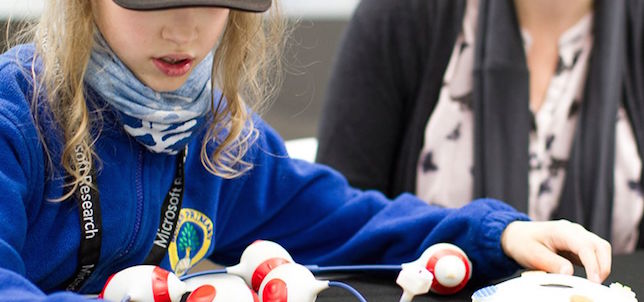Microsoft Project Develops Physical Programming Language for Blind Students
- By Dian Schaffhauser
- 06/01/17

Images courtesy of Microsoft.
A Microsoft project will teach blind students from seven to 11 years-old how to program and apply design thinking to projects.
"Project Torino," as it's called, uses a "physical programming language," pods that are connected by the students to build programs. Learners string the pods together to create code that plays music, stories and poetry. The idea is to allow kids with visual impairment to participate in coding exercises in their classes right alongside seeing students — or to allow all students to learn the basics of coding in a tactile way.
An additional app provides a self-directed course of work that the students can use with adult supervision. They're gradually introduced to reading or listening to their code in a textual form to make the transition to more traditional forms of coding in higher grades using assistive technologies such as screen readers.
As an article on the Microsoft site explained, the ultimate goal of the work is to attract students with visual impairments or other learning challenges, such as dyslexia or autism, into the programming fold and inspire them to consider careers as software engineers or computer scientists. This is a step apart from the norm that has pervaded contemporary computer science, which has evolved to use ever more visual coding methods, making it tougher for those who can't see to participate in the field.
An earlier, smaller trial among a dozen or so students gave researchers ideas for how to improve Torino. For example, originally, the pieces of the kit were all white. The students with limited vision encouraged them to use colors. Also, although smaller tends to be "better" in tech, the early testers pushed for larger pods, to enable students to work together.
Currently, researchers are seeking applicants to participate in a beta trial in the United Kingdom, which will begin in fall 2017. Learners will be allowed to participate as individuals or as part of a group, such as a "sensory service," special school or nonprofit organization. Beta testers will receive "Torino sets" as well as teacher training and mentoring for one school term.
Eventually, the researchers hope to make the project available to teachers and students in other countries.
About the Author
Dian Schaffhauser is a former senior contributing editor for 1105 Media's education publications THE Journal, Campus Technology and Spaces4Learning.